Android Problems: The Representation of Robots in Cinema
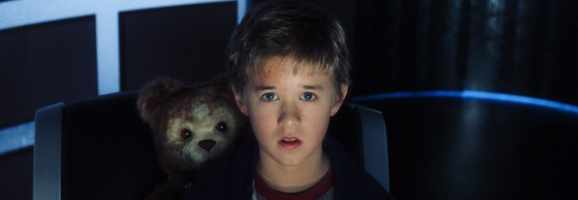
The science fiction genre is rife with films about artificial intelligence and, even before androids became a reality, cinema projected many fears about what was to come in the future. In the modern age, the humanoid is a very real creation and inevitably, as we move closer to a time of human and robot integration, filmmakers have continued to explore the effect this could have on society.
There are a variety of ways these characters have come to be represented onscreen and the categories outlined below foreground some common themes at work in mainstream cinema. Exceptions inevitably arise and they raise questions as to whether or not things might be starting to change. The three conventions I have noted below, The Pinocchio Predicament, Villainising Androids, and Robot Companions, continue to inform a large portion of Sci-Fi narratives today, despite the potential for change that new developments have provided.
There will be some spoilers.
The Pinocchio Predicament
The recycling of classic stories has been common practice in Hollywood for decades. From Disney’s vivid reimaginings of fairy tales to the wave of genre pictures reusing formulas, the same stories are used time and time again. This is not necessarily a bad thing as it can provide a solid foundation for filmmakers to explore wider ideas. The story of Pinocchio, written in the 19th century by Carlo Collodi and later adapted into the 1940 Disney animation, has become a significant contributor to many Sci-Fi narratives.
The ‘Pinocchio Predicament’, or the desire to be human, is something that many artificially intelligent characters suffer from within these narratives. The Pinocchio story is in itself a very effective cinematic device, hence its continued prominence in mainstream cinema. The issue with having artificially intelligent creations is that they can be difficult to sympathise with on an emotional level. The desire to become human gives these characters an emotional edge that makes them much easier to understand as they crave something we possess. This is problematic in that, for these characters to be liked, they must be turned into self-loathing, pitiful creatures that see themselves as inferior to humans.
Tim Burton’s Edward Scissorhands is a perfect example of how this device is used. Edward is made by an inventor who wishes to create a robot with emotions. After the inventor’s death, Edward is left unfinished with scissors for hands and faces a number of social and physical challenges due to his disability. His problem is an extreme manifestation of the Pinocchio predicament. There is no need for his creator to give him such a dangerous set of temporary hands but this is used as a plot device to make him look terrifying on face value and immediately distance him from human characters. Despite the suburban residents embracing the services his scissor-hands provide, his defect constantly prevents him from fully integrating into the community. His desire to fit in, combined with the fact he will always be an outsider allows the audience to grow fond of him. Through his suffering and inferiority complex he ultimately becomes harmless and sympathetic.
This idea can be traced back to The Wizard of Oz where the amiable Tin Man’s one and only wish is to have a heart; the only element he believes will make him whole. Whether it be hands or a heart, both characters are insecure and desire things they perceive to be crucial to becoming ‘real’ – something which is always tied to human physicality. As The Wizard of Oz was made in the late 1930s, adapted from an early 20th century novel, it can’t be used as an example of anxieties related to technology in the modern era but it has clearly influenced filmmakers and writers in later narratives and helped them find a way to convey these fears.
The Pinocchio story is frequently used to bridge the gap between audiences and man-made characters but it also works as a tool to suppress the influence artificially intelligent characters have in the world of humans. In Spielberg’s A.I. when the naïve android David is encouraged to cut off a lock of his mother’s hair the act is misinterpreted as him trying to hurt her. Edward is also victim to misinterpretation because his hands make him look threatening and he can do unintentional harm to others. The wariness characters within these narratives display towards David and Edward only adds to their self-loathing. They do little to assert themselves but often, especially in the case of David, become infatuated with the idea that they will never be accepted unless they become human. The film Bicentennial Man is structured entirely around this concept as robot Andrew spends decades trying to be legally recognised as a human.
Evidence of this structure can even be found in Sci-Fi cornerstone Blade Runner. The film is concerned with a group of replicants who illegally return to earth in order to prolong their lifespan and avoid termination. Their need is not something physical as they are already identical to humans in appearance but they still crave something we have and they don’t. They see happiness as tied to the lifespan of a human and this is simply another recycling of the Pinocchio predicament.
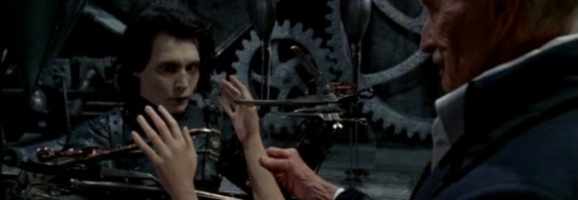
Villainising Androids
On the opposite end of the scale are those who appear to have no desire to become human at all. As technology becomes more advanced and the chance of full human and robot integration becomes probable, what were once fictional devices have become very real representations of anxieties within society. The issue with artificially intelligent creations is that there is always potential for them to become more intelligent and powerful than humans. We are limited in ways that robots are not and thus, as a way of suppressing any fear surrounding their influence, the droids become villains to overcome. It is in the moment that human characters manage defeat the villain that our faith in the superiority of mankind is restored.
Perhaps the most famous of all time is HAL 9000 in Stanley Kubrick’s 2001: A Space Odyssey. It’s interesting how Kubrick presents technological advancement in all its glory, allowing us to admire the grandeur of huge space crafts, but when it comes to artificial intelligence he has a much more negative approach. HAL is introduced as a remarkable new computer system with intelligence above and beyond that of any human. It is soon revealed, however, that despite being ‘incapable of error’ the device is dismissive of human emotion and will stop at nothing to maintain the goal of the mission. Astronaut Dave goes on to destroy HAL’s logic memory centre, assuring the audience that humans will always prevail.
The same pattern can be seen in later films such as Alien and I,Robot. The robots in these films are made with a very specific purpose but become threatening as human life is secondary to their programmed goal. Alien recycles the same predicament as 2001 when it is revealed that the ship’s droid, Ash, sees the preservation of human life as secondary to that of the creature they discover on their mission. The crew go on to decapitate him, asserting the power of humans once more. This is actually very ironic within the film’s context because the entire research team, bar one, end up being killed anyway. Despite Ash’s desire to preserve the organism being completely justifiable, it becomes a narrative device put in place to allow the other characters to villainise and destroy him. These cyborgs are frequently characterised as ruthless and lacking in emotional understanding. This is used in a lot in films depicting dictatorship and oppression such as THX 1138 and The Matrix where droids will stop at nothing to maintain order.
Director Ridley Scott seems particularly fascinated with this idea. In both Alien and Prometheus he allows androids Ash and David to integrate freely amongst humans but soon exposes their ulterior motives, undermining their potential to be accepted as equals. The evil android archetype has been present in cinema for decades, dating all the way back to Fritz Lang’s Metropolis where the robot Maria becomes the physical manifestation of a madman’s evil ambitions. From the Gunslinger in Westworld to the ED-209 in Robocop, these characters display technology in all its glory but come to be destructive and dangerous forces.
Robocop is an interesting film in relation to this for other reasons too. The film’s protagonist, Murphy, becomes the people’s saviour in robot form but only because he started out as a human. In a the same way as those facing the Pinocchio predicament, his past life as a real person humanises him and makes him seem more trustworthy. He is constructed from the flesh of a human and thus he can be accepted as a protector to the people. On the other hand, the completely man-made ED-209 is shown to be dangerous because it has no human aspect to it at all.
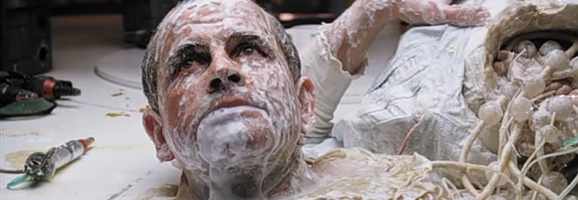
Robot Companions
The robot companion is one of the more positive representations of androids that can be found in mainstream cinema. When robots do not have the desire to become human and have no wish to harm them they often take on the role of protector. Huey, Dewey, and Louie in Silent Running and Johnny Five from Short Circuit are great examples of this. They manage to carry out tasks in the aid of human characters and fully integrate themselves without being perceived as a threat. The Star Wars franchise is also notable as R2-D2 and C-3PO hugely influenced this trend.
James Cameron is an important filmmaker when it comes to the use of robot companions in cinema. He seems to have no problem with depicting more likeable and self-assured androids that have a positive impact on human characters. Despite the T-800 being a hardened assassin in the first Terminator film, Cameron asserts his willingness to depict the positive side of androids in the second instalment. Here, he has the exact same cyborg reprogrammed to be the sole protector of John Connor. He doesn’t completely discard the evil robot archetype as there’s a new villain in the form of the T-1000 but the new and improved terminator is a step in the right direction for Sci-Fi cinema.
Cameron also takes a new approach in the film Aliens. By including the robot Bishop he appears to be going down the same route as Ridley Scott at first by introducing a potential threat to the human characters. Surprisingly, Bishop ends up being of extreme importance and great help to Ripley at the expense of his robot life. His sacrifice is still part of a dilution process though because he clearly prizes the life of humans over his own synthetic one. This retains the inferiority complex present in artificially intelligent characters because he sees himself as a protector to a superior being that must be preserved.
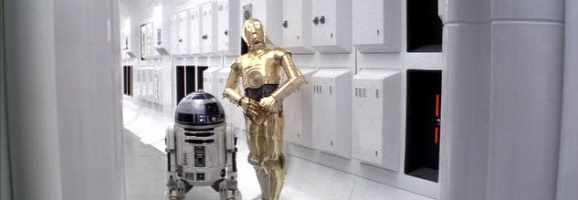
As the Sci-Fi genre is so broad, the categories above apply to only a handful of themes and films. It’s interesting that the three prominent trends I’ve noted can be traced throughout decades of cinema right up to the present day, despite artificial intelligence changing from a plot device to reality. It seems that there is still a general feeling of uneasiness present in society and the need to make these inventions either completely harmless or completely evil.
There’s definitely some potential for change in the future though. The animated film Robots was a step up because it depicts androids with varying personalities and completely removes them from human influence. The characters are constructed from human archetypes but allowed their own form of expression through a combination of biological and mechanical traits. They are not slaves to humans and, although the film has a villain, his evil desires are no different from that of an evil mastermind in any narrative. The fact they are robots is not used as a way to present fears about technology, it is simply a way of reworking the equilibrium-disequilibrium structure of storytelling.
Another important progression can be found in Spike Jonze’s Her. Although Samantha does not have a physical form and the film is closer to science fact than science fiction, she is allowed to express herself as an individual without being threatening, self-loathing or a slave to her human owner. Her eventual decision to leave Theodore behind and pursue her own desires is a very empowering moment. She is not confined by her role as his companion and is able to assert herself and explore the world in the way she wants to.
It looks like there’s potential for change in the future as artificial intelligence, particularly that which takes human form, becomes an unquestioned part of society. Perhaps after some time it will become commonplace for cyborgs and humans to be interchangeable as equals but for now there’s still some work to be done.
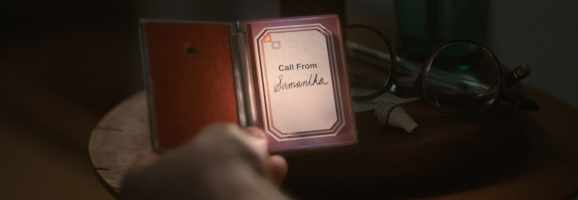
What do you think? Leave a comment.











Great article! Interesting read and well-researched. Nice job!
I’m watching Metropolis at school. It’s such an amazing movie. When Maria does that erotic dance, gosh it’s hilarious.
Good post. However there was no mention of Battlestar Galatica. Both the tv show during the seventies as well as the cable version.
Unfortunately I’ve always been more into film than TV so I haven’t seen Battlestar Galactica.
The ultimate (hottest) robot is Battlestar Galactica’s #6
I’ve always found the cyborg angle most interesting when it’s used to highlight the differences between humans and artificial intelligence. TNG, Voyager and even Red Dwarf have done this in compelling ways.
At what point does “AI” become just “I”, and therefore deserving of the same rights and treatment as humans?
Don’t you think it’s scandalous that a robot hasn’t won an Oscar yet. Not even a best supporting bot.
This is one of my favorite subjects–Hollywood robots! I have memories of 50’s sci fi with some of the lesser known robots that starred in B movies.
A greatly informative and well-written article!
My favorite mechanical man is Robby the Robot, but the Cylons from Battlestar Galactica used to scare the crap outta me!
Anyone interested in androids should check out Roujin Z and Battle Angel Alita for the anime side of this list.
There’s some really solid analysis and research in this article. Makes for a really interesting read!
Great article! Loved the attention to detail! Androids/robots/cyborgs have always made for fascinating foils for human characters. Characters like Robocop and Ash comment on every detail of humanity. From this, the humans have something to prove. Works a lot of the time.
I enjoyed your article.
Good use of images to support your work.
I love the term Pinocchio Predicament.
Metropolis is a Fascinating movie. Very Weird how the Robot was introduced in front of a Huge Satanic Pentagram!
Very well done, thanks for sharing!
That was a good article. I have been writing about my favorite robots, androids and cyborgs and with all the research I have done I still found something here that I have not come across.
The kind of antagonist post-Robocop is generally concerned with working over the fear that in our reliance on technology, we’re being fundamentally altered by technology. It’s the same general idea as Chaplin explores in the production line sequence of Modern Times, and Lester developed further in Superman III.
Bicentennial Man need to be praised.
I love this article! I’ve only recently got into Scifi but these character types are really interesting. Thank you!
One of the most unique robots on the big screen was the motion picture robot in the movie “HUGO”.
I need to watch both Metropolises (the regular one and the anime one).
I’ve read “Do Androids Dream of Electric Sheep?” and watched BladeRunner (one of my favs). Maybe not closely enough, because I thought that replicants were definately, 100% machine. The issue was that they replicated humans so perfectly that they couldn’t tell them apart. They only had a 4 year life span, so why “replicate” yourself if you were only going to die shortly thereafter? They were robots. The big question Ridley Scott wanted to illicit from one of his cuts of BladeRunner was whether Deckard was a replicant, too.
I suppose this is just picking nits, but the Replicants in “Blade Runner” were not “robots”. They were genetically-engineered, lab-grown biological, super-humans with a four-year lifespan (except for Rachel, of course, and *maybe* Deckard, himself).
Robbie the Robot from the original movie ” Forbidden Planet ” is the king of robots.
Obviously Jet Jaguar is the greatest robot of all time
I would like to add at least two missing great imaginative “robots” (unforgettable when you have seen them once…):
1) “Screamers” (1995) by Christian Duguay and starring Peter Weller is a sf movie based on the short story “Second Variety” by Philip K. Dick. In this movie you find the Autonomous Mobile Sword, or “screamer”. Like in “Blade Runner” there is an ambiguity about who is, and who isn’t, a human being. Some of the elements seem recycled out of “Alien,” (especially the basic situation)..uhm Dan O’Bannon worked on both of the screenplays.
2) “Cherry 2000” (1987) by Steve De Jarnatt and starring
Melanie Griffith introduces the “perfect sex machine,” the “Cherry 2000” android. Incidentally the movie was shot entirely in the state of Nevada, well known for its legalized brothels…
Computer-generated robots like Transformers never impressed me. To me, they are no more than made-for-adult-cartoons of the old. I will never dish out the 15-20 bucks to see this movie.
Thank you for a lovely trip down memory lane.
I always liked the robot from the old lost in space tv show. And there was a robot in the 1980 film Saturn 3 that was downright frightening.
Interesting article. If I had to have a robot pal, I would take the ‘Lost In Space’ robot. He was smart, a good conversationalist, built in tasers and could play a decent rhythm guitar.
Great overview. Would love to read more about your thoughts on ‘Her’ in relation to our cinematic history of representing robots.
Fantastic article! You mention demonizing androids and I definitelythought of growing fear of technology but I’m surprised you never mentioned the terminator
This was a really interesting post! The same predicament exists in other forms of media as well. In Mass Effect, EDI, the AI of the protagonist’s spaceship, tries to pursue a relationship with the human pilot of the ship. These feeling are reciprocated by the pilot, which I found kind of weird. One of the things I really like about the Mass Effect game is the portrayal of A.I. Basically every concern you stated in the article is embodied in some way throughout the game From EDI and her unconventional relationship and need to become a human to the AI rebellion that is prevalent throughout the galaxy.
It’s pretty cool, but the main point is this article you wrote is pretty eye opening and is aplicable in lots of media. Cool!
Great thinking here : ) This would be a great article from now to show people from fifty years ago!
I don’t know if there could be a better classification scheme. Good call.
I would leave A.I.: Artificial Intelligence out of the scheme, though, for two reasons:
* The boy is only a robot to make it less heart-wrenching, than if a real human little boy were dismissed by his father, left in the woods by his mother (!), and had government and industry tracking him so they can kill him (!); and
* The boy’s quest wasn’t so much to become human, as to find that his mother loved him after all.
Generally the techie crowd I run into doesn’t get Spielberg’s movie at all: they snort that this is not how real AI programs work. Which is true: it’s how little boys work. A gut-wrencher, seen from that perspective.
I enjoy movies with androids because they bring up some many topics for discussion and the ideas of a soul and humanity. They show the best and/or worse sides of our humanity because they are created by us.
The treatment of Artificial Intelligence in the media is remarkably similar to the treatment of African Americans in the early cinema: the self-conscious inferior, the happy slave looking up to his massa, and the degraded, if not villainized, character. I recognize that it might be a bit of a stretch, but there are some very interesting parallels between the media’s treatment of androids and of marginalized groups of people.
I loved ‘Her’ I thought it was one of the best scripts i’ve seen. I did like your article, though it made me giggle that you seemed to be treating Androids as if they are a mis/under-represented race in film! AI is ultimately sci-fi (Thankfully. I worry about human inteligence, let’s not make things even more complitcated shall we!?)
Really good article. Moments like you mentioned in the film Her are truly empowering and these are the ideal moments how AI should be depicted in such films. Nice job for all the good work you did for this article!
We can debate endlessly. But reality is clear. We need better machines to enhance our capabilities AT calculating decissions, NOT to make choices on their own. Self-awareness is the LAST thing you want on a machine.
And, why build them like us? The sole engineering of building a fully functional humanoid, regardless of its programming, is huge; and in my view, a waste of time and tecnology. Creating an artificial limb or an eye is research only justifiable in the realm of prosthetics; to improve disadvantaged humans. But, why to create an artificial colleague WITH HUMAN APPEARENCE, totally indistinguishable from real humans?
Many cite a better interaction as the reason. WRONG. The moment its un-human nature is evident, human response is of immediate rejection, even profound revolt. Some sci-fi flicks dwelve into the horror category BECAUSE of this unconscious reaction. The ‘un-canny valley’ theory is an indicator of this response. This is why those dreaded ‘peel-off’ scenes revealing the inner workings of androids are ALWAYS a must in robot themed movies and tv shows in order to draw the necessary startling response that makes an entertaining device work. But the un-human nature of such entities is even more scarier as we ALL are displeased by a human-endowed being displaying erratic un-human behavior (jerkyness, rigidity)
Fear in this circumstances borders phobia and can severely traumatise a person (Capgras syndrome) Giving a robot human-like appearence (androids, fembots or gynoids) SHOULD NOT be allowed. Humans can interact better with mechanical artifacts as long as humans KNOW they’re machines.
Maybe in hazardous environments like the inside of a nuclear facility or outer space, an artificially crafted assistant with semi-autonomous capabilities can be of some use, but as long as its powers are ALWAYS under human control. It doesn’t need to be anthropomorphic. It doesn’t need a polymer-based skin to perform better at its tasks; it doesn’t need gender or even clothing. As I said, the amount of science required to solve unnecessary problems like ‘facial expressions’ or ‘muscle-like texture’ is redundant on a robot. Very well defined parameters to its logic should be the main focus for the developers of such assistance machines.
As for manufactured organic beings, like Blade Runner’s ‘Replicants’ the ethics of this are far worse. That’s the whole point of the movie. Robot advocates think Blade Runner deals in the philosophy of what it is to be human. They’re wrong. It’s obvious that ‘Replicants’ are endowed with human attributes and physically were engineered that way. But they’re LIVING BEINGS. They breathe, they bleed when shot, they eat. Somehow the Tyrell Corp. has ‘replicated’ human DNA, and have synthesized its sequence into a much more simple strain, enough to create a ‘low-resolution’ copy or clone of a human (as shown in the V.K. scanning of Rachel’s retina) that has been patented and commercially marketed. Bred by an accelerated growth since its inception, with a limited life span and obviously incapable of breeding. Such creatures are not mechanical but organic, therefore cannot be shut down but killed. As the movie implied “It wasn’t an execution. It was retirement.” Are we humans permitted to do as we please just because we can build something? And, even being the result of human ingenuity, the engineered ‘Replicants’ can be totally unpredictable, as humans are.
So for the moment, we have done extremely well without the assistance or the worries that come with artificial persons or humanoids. Our universe is being explored with unmanned probes with excellent results each time, and there is no doubt artificial intelligence may happen soon, but if humans aren’t at the center of all this achievements, then, why bother?